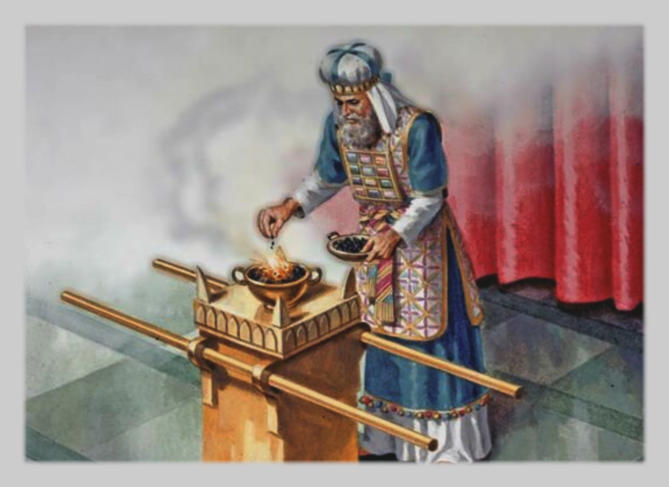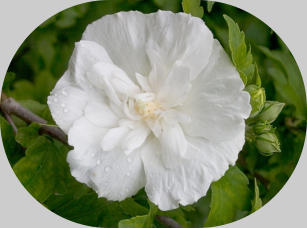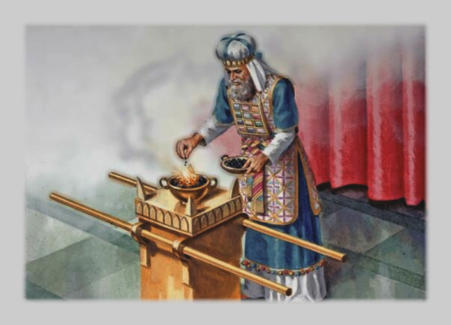“Then
Noah
built
an
altar
to
the
Lord,
and
took
of
every
clean
animal
and
of
every
clean
bird
and
offered
burnt
offerings
on
the
altar.
And
the
Lord
smelled
the
soothing
aroma;
and
the
Lord
said
to
Himself,
‘I
will
never
again
curse
the
ground
on
account
of
man,
for
the
intent
of
man’s
heart
is
evil
from
his
youth;
and
I
will never again destroy every living thing, as I have done’”
(Gen. 8:20,21).









Making Sense of Scents
Smell
is
the
most
underrated
of
the
five
senses.
People
function
with
great
difficulty
if
they
lose
their
sight,
hearing,
or
touch,
but
they
think
they
can
get
along
well
enough
without
being
able
to
smell.
It
is
also
the
least
controllable
of
the
senses.
The
eyes
can
be
closed,
the
mouth
shut,
the
hand
withdrawn,
and
the
ears
plugged,
but it is hard to avoid smelling bad odors.
Yet,
the
sense
of
smell
deserves
more
recognition
than
it
gets.
One
expression
of
its
importance
is
the
connection
between
taste
and
smell.
Losing
smell
means
losing
taste.
A
sense
of
smell
is
also
critical
to
avoiding
danger.
Fire
is
often
first
detected
by
the
smell
of
smoke.
Animals
depend
on
their
sense
of
smell
for
survival.
They
need
it
to
detect
prey
or
threats,
perhaps
from
great
distances.
Elephants
and
camels
smell
water
many
miles
away.
Skunks
use
noxious
odor
to
defend
themselves.
Mammals
identify their young by their smell.
Even
humans
rely
on
their
sense
of
smell
more
than
they
realize.
Bad
odors
are
danger
signs,
indicating
that
food
is
not
fit
to
eat.
On
the
other
hand,
the
aroma
of
food can aid appetite.
However,
the
importance
of
smell
goes
beyond
its
practicality.
The
perfume
industry
bears
witness
to
that.
Smelling
her
husband’s
scent
on
his
clothes
in
his
closet evokes for his widow the most vivid sense of his lingering presence.
The
Bible
verifies
these
facts.
For
example,
Paul
suggests
a
hierarchy
of
senses
when
he
places
smell
last
in
his
list
(1
Cor.
12:17).
Yet,
when
Isaac’s
eyesight
had
dimmed
and
he
did
not
trust
his
sense
of
touch
to
identify
Esau,
he
relied
on
his
sense
of
smell
(Gen.
27:18-27).
The
Bible
refers
to
sacrifices
as
a
“soothing
aroma”
to
God
more
than
forty
times.
God
even
provided
for
a
special
altar
in
the
tabernacle,
where
priests
burned
incense
twice
a
day
(Ex.
30:1-10).
On
pain
of
death,
the
high
priest
was
required
to
enter
the
most
holy
place
annually
on
the
day
of
atonement
to
burn
incense
to
cover
the
ark
with
its
smoke
(Lev.
16:12,13).
Paul
calls
Christ’s
sacrifice
a
“fragrant
aroma”
to
God
(Eph.
5:2).
Christians’
good
works
are
described
the
same
way
(Phil.
4:18).
Paul
also
portrayed
himself
as
either
an
aroma
of
life
or
odor
of
death,
depending
on
whether
the
gospel
he
preached
was
received
or
rejected
(2
Cor.
2:14-16).
John
refers
to
the
prayers
of
the
saints
as
the
smoke
of
incense
which
rises
up
to God (Rev. 5:8; 8:3,4).
This
world
holds
many
sources
of
awful
odors,
such
as
sewage
plants,
paper
mills,
and
hog
farms,
which
waft
miles
away
to
annoy
and
even
nauseate.
People
cope
with
them
by
avoiding
them
or
masking
them.
Yet,
some
adapt
to
the
odors
of
their
environment
by
adopting
them,
like
the
smell
of
campfire
smoke
on
clothing,
and
simply becoming used to them.
After
God
struck
Egypt
with
plagues,
“the
land
stank”
(Ex.
7:21;
8:14).
So
it
is
with
this
world.
As
the
crimes
of
Jacob’s
sons
made
him
to
stink
to
the
Canaanites
(Gen.
34:30),
so
sin
is
a
stench
in
God’s
nostrils.
As
dead
flies
overwhelm
the
power
of
perfume
(Eccl.
10:1),
so
sinners
cannot
mask
the
odor
of
sin
which
clings
to
them
and
rises
from
their
lives.
Their
only
recourse
is
to
cover
themselves
with
the
savor
of
Christ’s sacrifice.
Moral
character
gives
off
an
unmistakable
odor,
and
God
has
a
very
fine
sense
of
smell.
None
can
escape
the
smell
of
his
environment.
God
knows
where
a
person
has
been
by
the
smell
he
gives
off.
If
he
wallows
with
swine,
he
comes
away
smelling
like
them,
but
if
he
has
made
the
Savior
his
associate,
he
comes
away
“smelling
like
a
rose”
— indeed, “the Rose of Sharon.”
Hibiscus syriacus - Rose-of-Sharon
Copyright © 2017 - current year, Gary P. and Leslie G. Eubanks. All Rights Reserved.

Making Sense of Scents
Smell
is
the
most
underrated
of
the
five
senses.
People
function
with
great
difficulty
if
they
lose
their
sight,
hearing,
or
touch,
but
they
think
they
can
get
along
well
enough
without
being
able
to
smell.
It
is
also
the
least
controllable
of
the
senses.
The
eyes
can
be
closed,
the
mouth
shut,
the
hand
withdrawn,
and
the
ears
plugged,
but
it is hard to avoid smelling bad odors.
Yet,
the
sense
of
smell
deserves
more
recognition
than
it
gets.
One
expression
of
its
importance
is
the
connection
between taste and smell. Losing smell means losing taste.
A
sense
of
smell
is
also
critical
to
avoiding
danger.
Fire
is
often
first
detected
by
the
smell
of
smoke.
Animals
depend
on
their
sense
of
smell
for
survival.
They
need
it
to
detect
prey
or
threats,
perhaps
from
great
distances.
Elephants
and
camels
smell
water
many
miles
away.
Skunks
use
noxious
odor
to
defend
themselves.
Mammals
identify their young by their smell.
Even
humans
rely
on
their
sense
of
smell
more
than
they
realize.
Bad
odors
are
danger
signs,
indicating
that
food
is
not
fit
to
eat.
On
the
other
hand,
the
aroma
of
food
can aid appetite.
However,
the
importance
of
smell
goes
beyond
its
practicality.
The
perfume
industry
bears
witness
to
that.
Smelling
her
husband’s
scent
on
his
clothes
in
his
closet
evokes
for
his
widow
the
most
vivid
sense
of
his
lingering
presence.
The
Bible
verifies
these
facts.
For
example,
Paul
suggests
a
hierarchy
of
senses
when
he
places
smell
last
in
his
list
(1
Cor.
12:17).
Yet,
when
Isaac’s
eyesight
had
dimmed
and
he
did
not
trust
his
sense
of
touch
to
identify
Esau,
he
relied
on
his
sense
of
smell
(Gen.
27:18-27).
The
Bible
refers
to
sacrifices
as
a
“soothing
aroma”
to
God
more
than
forty
times.
God
even
provided
for
a
special
altar
in
the
tabernacle,
where
priests
burned
incense
twice
a
day
(Ex.
30:1-10).
On
pain
of
death,
the
high
priest
was
required
to
enter
the
most
holy
place
annually
on
the
day
of
atonement
to
burn
incense
to
cover
the
ark
with
its
smoke
(Lev.
16:12,13).
Paul
calls
Christ’s
sacrifice
a
“fragrant
aroma”
to
God
(Eph.
5:2).
Christians’
good
works
are
described
the
same
way
(Phil.
4:18).
Paul
also
portrayed
himself
as
either
an
aroma
of
life
or
odor
of
death,
depending
on
whether
the
gospel
he
preached
was
received
or
rejected
(2
Cor.
2:14-16).
John
refers
to
the
prayers
of
the
saints
as
the
smoke
of
incense
which
rises
up
to
God
(Rev.
5:8; 8:3,4).
This
world
holds
many
sources
of
awful
odors,
such
as
sewage
plants,
paper
mills,
and
hog
farms,
which
waft
miles
away
to
annoy
and
even
nauseate.
People
cope
with
them
by
avoiding
them
or
masking
them.
Yet,
some
adapt
to
the
odors
of
their
environment
by
adopting
them,
like
the
smell
of
campfire
smoke
on
clothing,
and
simply
becoming
used to them.
After
God
struck
Egypt
with
plagues,
“the
land
stank”
(Ex.
7:21;
8:14).
So
it
is
with
this
world.
As
the
crimes
of
Jacob’s
sons
made
him
to
stink
to
the
Canaanites
(Gen.
34:30),
so
sin
is
a
stench
in
God’s
nostrils.
As
dead
flies
overwhelm
the
power
of
perfume
(Eccl.
10:1),
so
sinners
cannot
mask
the
odor
of
sin
which
clings
to
them
and
rises
from
their
lives.
Their
only
recourse
is
to
cover
themselves
with the savor of Christ’s sacrifice.
Moral
character
gives
off
an
unmistakable
odor,
and
God
has
a
very
fine
sense
of
smell.
None
can
escape
the
smell
of
his
environment.
God
knows
where
a
person
has
been
by
the
smell
he
gives
off.
If
he
wallows
with
swine,
he
comes
away
smelling
like
them,
but
if
he
has
made
the
Savior
his
associate,
he
comes
away
“smelling
like
a
rose”
— indeed, “the Rose of Sharon.”
Hibiscus syriacus - Rose-of-Sharon
Copyright © 2017 - current year, Gary P. and Leslie G. Eubanks. All Rights Reserved.
“Then Noah built an altar to the Lord, and took of every clean animal and
of every clean bird and offered burnt offerings on the altar. And the Lord smelled
the soothing aroma; and the Lord said to Himself, ‘I will never again curse the
ground on account of man, for the intent of man’s heart is evil from his youth; and
I will never again destroy every living thing, as I have done’” (Gen. 8:20,21).








